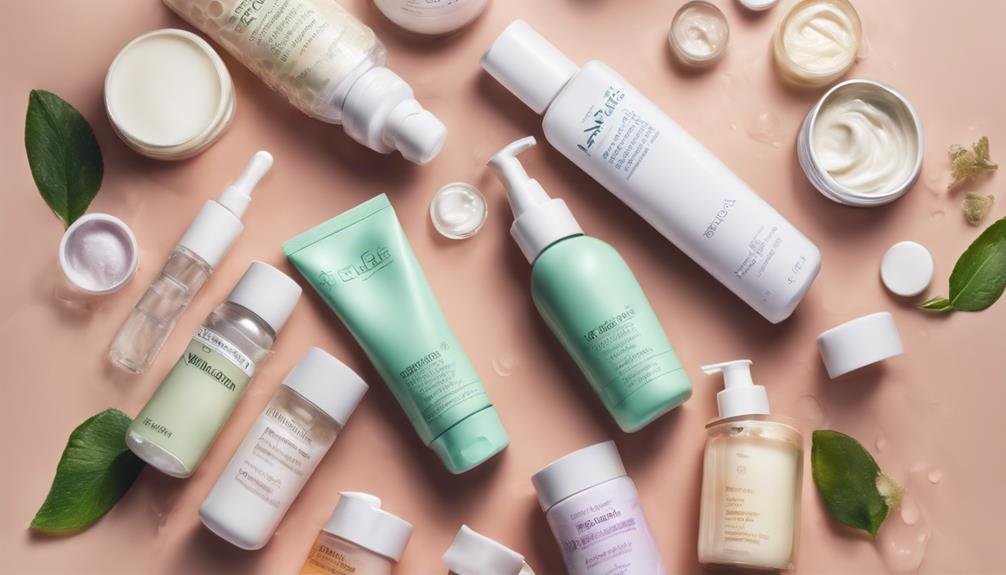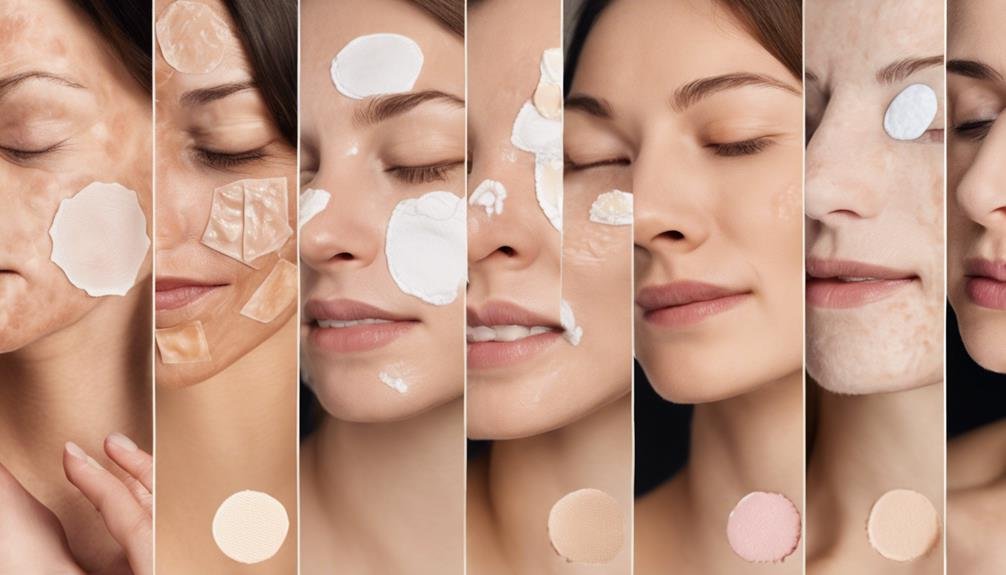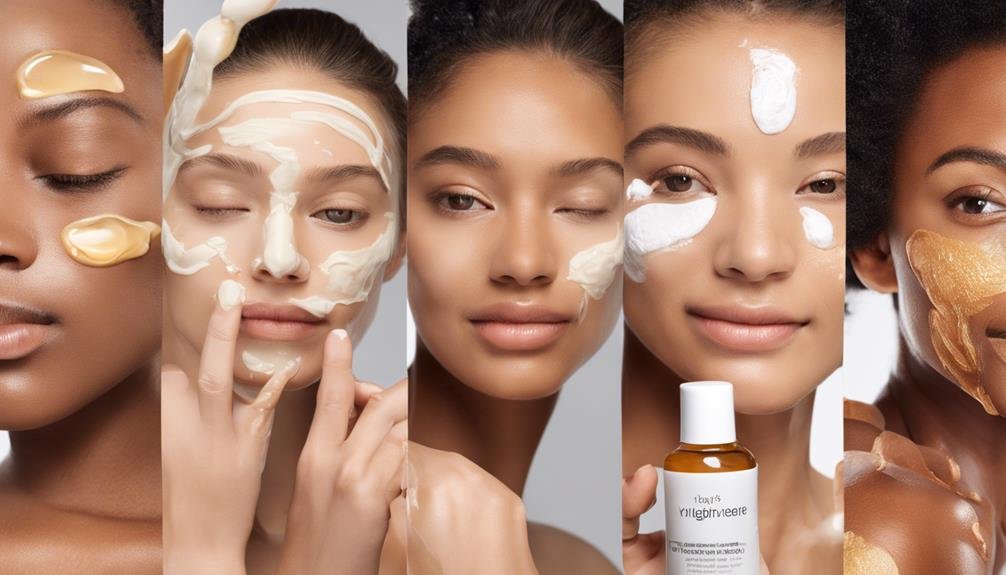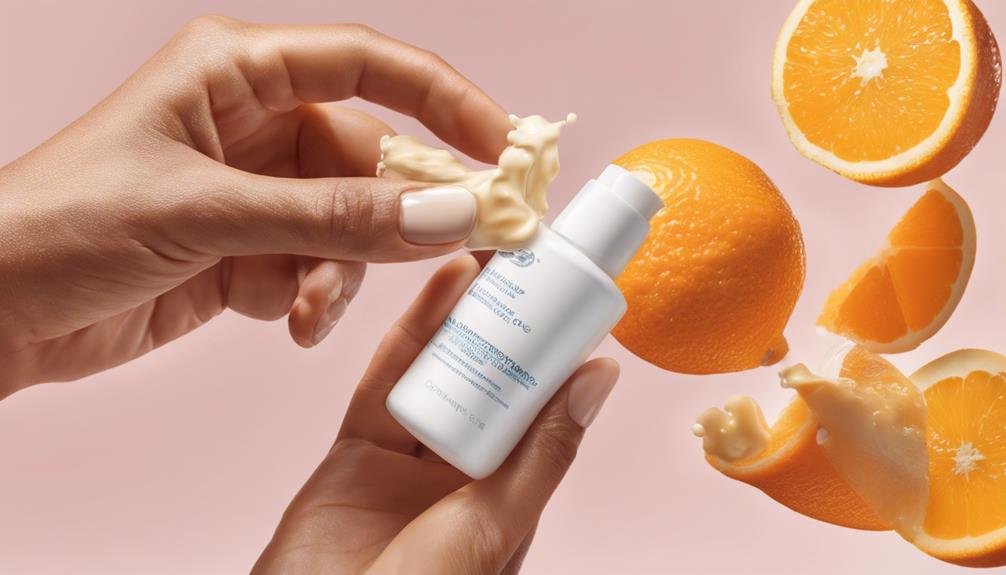When it comes to selecting the perfect moisturizer, it's crucial to match it with your specific skin type and concerns. You might be surprised how different formulations can affect your skin's health and appearance. From creams to gels to lotions, each offers unique benefits that cater to various skin conditions. However, the real key lies in the ingredients. So, before you make your final decision, make sure you understand the key components that will help you achieve that coveted healthy glow.
Key Takeaways
- Consider skin type: Normal, oily, dry, combination.
- Choose suitable formulation: Creams, lotions, gels, ointments.
- Prioritize key ingredients: Hyaluronic acid, antioxidants, peptides.
- Opt for non-comedogenic and fragrance-free options.
- Assess added skincare benefits: SPF, collagen boosters, etc.
Determine Your Skin Type
When choosing the right moisturizer, the first step is to accurately determine your skin type. Understanding your skin type is crucial as it helps you select a moisturizer that will address your specific needs. There are generally four common skin types: normal, oily, dry, and combination.
Normal skin is well-balanced, not too oily or dry. It has a smooth texture and few imperfections. Oily skin tends to be shiny, with enlarged pores and is prone to acne. Dry skin feels tight, may have flakiness, and lacks moisture. Combination skin is a mix of oily and dry, where some areas are oily, usually the T-zone, while others are dry.
To determine your skin type, observe how your skin feels throughout the day. Pay attention to factors like oiliness, dry patches, and any sensitivity. Consulting with a dermatologist can also help you accurately identify your skin type for optimal moisturizer selection.
Consider Your Skin Concerns
To effectively choose the right moisturizer for your skin, it's essential to consider your specific skin concerns. Different skin concerns require different ingredients in a moisturizer to address them effectively.
If you have dry skin, look for moisturizers with ingredients like hyaluronic acid or glycerin to provide intense hydration. For oily or acne-prone skin, opt for oil-free or non-comedogenic formulas to prevent clogged pores. Those with sensitive skin should choose moisturizers with soothing ingredients like aloe vera or chamomile to avoid irritation.
If anti-aging is a concern, seek moisturizers with ingredients such as retinol, peptides, or antioxidants like vitamin C to help reduce the appearance of fine lines and wrinkles. Uneven skin tone can benefit from moisturizers containing niacinamide or kojic acid to brighten and even out the complexion.
Understand Different Formulations
Understanding different formulations of moisturizers is crucial in selecting the most suitable product for your skin. Moisturizers come in various formulations such as creams, lotions, gels, and ointments, each tailored to different skin types and needs.
Creams are hydrating and provide a protective barrier without feeling too heavy, making them suitable for normal to dry skin.
Lotions are lighter and more easily absorbed, ideal for oily or combination skin.
Gels are lightweight and non-greasy, perfect for acne-prone or sensitive skin.
Ointments are the thickest and most hydrating, beneficial for extremely dry or damaged skin.
Consider your skin type and concerns when choosing a moisturizer formulation. If you have oily skin, opt for a lightweight lotion or gel to avoid clogging pores. Dry skin may benefit from a rich cream or ointment to lock in moisture. Combination skin can benefit from using different formulations on different areas of the face. Understanding these differences will help you select the right moisturizer for your unique skin needs.
Read the Ingredient List
Ensure you start your journey to selecting the right moisturizer by carefully reading the ingredient list. The ingredient list provides valuable information about what goes into the product and can help you determine if it aligns with your skincare needs.
Look for key ingredients like:
- Hyaluronic acid for hydration
- Glycerin for moisture retention
- Antioxidants like Vitamin C for added skin benefits
Be wary of potential irritants such as fragrances, alcohol, or parabens, especially if you have sensitive skin. Understanding the ingredients can also help you identify potential allergens or substances that may not work well with your skin type.
When scanning the list, keep an eye out for active ingredients that target specific skin concerns you may have, like peptides for anti-aging or niacinamide for brightening. By familiarizing yourself with the ingredient list, you can make a more informed decision when choosing the right moisturizer for your skin.
Test for Sensitivity
After familiarizing yourself with the ingredients list of a potential moisturizer, the next step is to test for sensitivity before fully incorporating it into your skincare routine.
To conduct a sensitivity test, apply a small amount of the moisturizer on a patch of skin, such as the inner forearm. Leave it on for 24 hours, observing for any signs of irritation, redness, itching, or burning. If you experience any adverse reactions during this period, it's best to discontinue use to prevent further skin issues.
Testing for sensitivity is crucial, especially if you have sensitive skin or are trying a new product. Even if a moisturizer contains gentle ingredients, individual reactions can vary. This step helps you avoid potential allergic reactions or skin irritations that could worsen with prolonged use.
Choose Between Day and Night Moisturizers
When selecting a moisturizer, it's essential to consider the difference between day and night formulations. Day moisturizers are designed to provide lightweight hydration and often contain SPF to protect your skin from the sun's harmful rays. They're formulated to be worn under makeup and throughout the day without feeling heavy or greasy.
Night moisturizers, on the other hand, focus on repairing and replenishing your skin while you sleep. They're typically richer and more nourishing, aiming to restore moisture and repair damage accrued during the day.
Choosing between the two types depends on your skin's needs and the time of day you plan to use them. If you spend a lot of time outdoors, a day moisturizer with SPF is crucial. For nighttime, opt for a moisturizer that focuses on repair and rejuvenation.
Select the Right Texture
As you navigate the realm of moisturizers, another key factor to consider is the texture of the product. The texture of your moisturizer can significantly impact your skincare routine and overall satisfaction. Here are some common textures and their benefits to help you make an informed choice:
| Texture | Description | Benefits |
|---|---|---|
| Cream | Thick and rich texture, great for dry skin | Provides intense hydration |
| Gel | Lightweight and fast-absorbing | Ideal for oily or combination skin |
| Lotion | Medium consistency, suits most skin types | Balances hydration without heaviness |
Choosing the right texture can enhance the application experience and ensure that your skin receives the appropriate level of hydration. Consider your skin type and preferences when selecting a moisturizer texture to optimize the effectiveness of your skincare routine.
Factor in SPF Protection
To effectively protect your skin from the damaging effects of the sun, it's crucial to factor in SPF protection when choosing a moisturizer. Sunscreen is essential in preventing premature aging, sunburn, and reducing the risk of skin cancer.
When selecting a moisturizer with SPF, opt for a broad-spectrum formula that shields against both UVA and UVB rays. The Sun Protection Factor (SPF) number indicates how long the product will protect your skin from UVB rays compared to not wearing any sunscreen. Dermatologists recommend using a moisturizer with at least SPF 30 for daily use.
Remember to apply it generously and reapply every two hours, especially if you're outdoors. By incorporating SPF protection into your daily skincare routine, you're investing in the long-term health and youthfulness of your skin.
Prioritize products that offer both hydration and sun protection to maintain healthy and radiant skin.
Opt for Non-Comedogenic Options
For optimal skin health, prioritize moisturizers labeled as non-comedogenic to prevent clogged pores and potential breakouts. Non-comedogenic products are formulated to not block pores, making them ideal for all skin types, especially if you're prone to acne or have sensitive skin. These moisturizers contain ingredients that are less likely to cause irritation or trigger acne breakouts, ensuring your skin remains clear and healthy.
When selecting a moisturizer, look for the term "non-comedogenic" on the label to ensure it's designed not to clog pores. These products are typically lighter in texture and less likely to cause congestion in the skin, providing hydration without exacerbating existing skin concerns.
By opting for non-comedogenic options, you can maintain a balanced complexion and reduce the risk of developing acne or other skin issues related to blocked pores.
Prioritizing non-comedogenic moisturizers is a simple yet effective step in your skincare routine to promote clear, radiant skin while keeping potential breakouts at bay.
Decide on Fragrance-Free or Scented
When deciding between fragrance-free or scented moisturizers, it's important to consider how these different formulations may impact your skin. Fragrances in skincare products can sometimes cause irritation, especially for those with sensitive skin. Opting for fragrance-free moisturizers can help reduce the risk of adverse reactions.
On the other hand, scented moisturizers can provide a pleasant sensory experience, but they may contain additional ingredients that could potentially irritate your skin.
If you have sensitive skin or are prone to allergies, choosing a fragrance-free moisturizer is a safer option. Fragrances are known to be one of the top causes of allergic reactions in skincare products.
However, if you enjoy the sensory experience of scented products and don't have any sensitivities, a lightly scented moisturizer may be suitable for you. Always remember to do a patch test before fully incorporating a new product into your skincare routine to ensure it works well with your skin.
Look for Added Skincare Benefits
Enhancing your skincare routine involves more than just moisturizing; it's essential to look for added skincare benefits in your moisturizer. When choosing a moisturizer, consider options that offer extra advantages beyond basic hydration.
Look for ingredients like hyaluronic acid, which helps to retain moisture and plump the skin, reducing the appearance of fine lines and wrinkles. Antioxidants such as vitamin C or green tea extract can provide protection against environmental stressors and promote a brighter complexion.
Peptides are another beneficial ingredient that can stimulate collagen production, improving skin elasticity and firmness over time. Additionally, moisturizers containing SPF offer sun protection, preventing premature aging and reducing the risk of skin cancer.
Consider Budget and Value
To make an informed decision when selecting a moisturizer, it's important to consider your budget and the overall value you'll receive from the product. While skincare is essential, it doesn't have to break the bank. Look for moisturizers that offer a good balance between price and quality. Consider the size of the product and how long it will last with regular use. Sometimes investing a bit more upfront in a high-quality moisturizer can be more cost-effective in the long run, as you may need to use less product per application.
Think about the additional benefits a moisturizer provides beyond hydration. Some products offer multiple skincare benefits like anti-aging properties or SPF protection, which can add value to your purchase. Reading reviews and seeking recommendations can also help you gauge the effectiveness of a product and whether it's worth the price.
Frequently Asked Questions
Can I Mix Different Moisturizers for Better Results?
Yes, mixing different moisturizers can enhance results. Combining products with complementary ingredients can provide added benefits for your skin. However, be cautious of potential reactions or conflicts between formulas. Patch test first.
How Long Does It Take for a Moisturizer to Show Results?
Typically, it takes about 1-2 weeks for a moisturizer to show visible results. Consistency is key. Ensure you apply the product daily as directed. Remember, individual skin types may respond differently. Patience and persistence will yield the best outcome.
Should I Apply Moisturizer Before or After Serum?
You should apply serum before moisturizer. Serums contain active ingredients that penetrate deeply into the skin. Applying moisturizer after seals in the benefits of the serum and provides hydration. This order maximizes the efficacy of both products.
Can I Use the Same Moisturizer for Face and Body?
Yes, you can use the same moisturizer for face and body. Look for a product that is gentle, hydrating, and suits both skin types. Ensure it provides enough moisture for your face's delicate skin while being nourishing for the body.
Is It Necessary to Change My Moisturizer With the Seasons?
You should consider changing your moisturizer with the seasons. Different weather conditions can affect your skin's needs. Opt for lighter formulas in warm weather and richer ones in the cold to keep your skin hydrated and protected.
Conclusion
In conclusion, finding the right moisturizer is like finding the perfect key to unlock your skin's potential. By considering your skin type, concerns, and budget, you can select a product that will nourish and hydrate your skin effectively. Remember to read the ingredient list, test for sensitivity, and opt for non-comedogenic options to ensure a successful skincare routine. Choose wisely, and watch your skin thrive like a well-tended garden.







